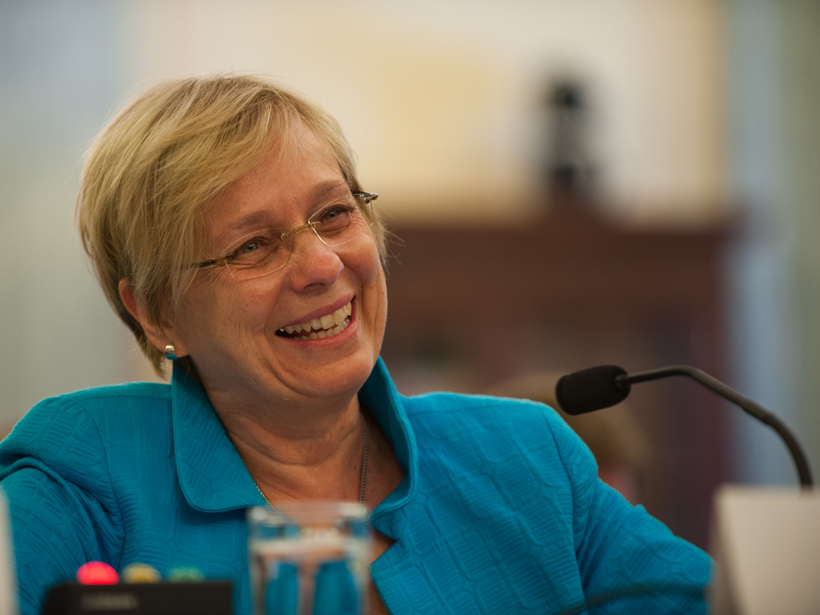Atmospheric scientist Susan Avery has been elected to the board of directors of the ExxonMobil Corporation.
Avery, former president and director of the Woods Hole Oceanographic Institution in Woods Hole, Mass., formally joins the board as one of 13 directors on 1 February, the company announced last week. Avery’s research interests include studies of atmospheric circulation and precipitation, climate variability, and water resources. Also, she has served on numerous committees, including the advisory committee to the National Research Council’s U.S. Global Change Research Program.
“We are delighted to add Dr. Avery’s scientific background and expertise, as well as her management experience, to the board of directors. ExxonMobil is a science-based company with a long-standing technical and scientific foundation, which will be complemented by Dr. Avery,” Alan Jeffers, media relations manager for the company, told Eos. He said that the company has always had scientists represented on the board.
ExxonMobil initially had opposed a proposal submitted by a shareholder to have a climate expert on its board.
ExxonMobil initially had opposed a proposal submitted by a shareholder to have a climate expert on its board. A 13 April 2016 letter from the company to its shareholders stated that “the Board is comprised of members with the credentials, proficiencies, and experience that enable the Board to effectively address climate-related issues.”
Attorneys general in several states currently are investigating whether the company withheld information indicating that human-made emissions have been changing the climate. An 11 January Massachusetts Superior Court ruling denied the company’s motion to set aside or modify a civil investigation into the company by the Massachusetts attorney general.
Reaction to Avery’s Election
A leader in the shareholder campaign on climate-related issues commented that the company’s move is significant. “We’ve seen Exxon’s gradual evolution from active denial of climate change to reluctant acknowledgement of its risks and now, its elevation in priority as an essential component of board management,” Fr. Michael Crosby of the Province of St. Joseph of the Capuchin Order said in a statement. He is executive director of the Seventh Generation Interfaith Coalition for Responsible Investment. “Apart from the enormous environmental and social risks facing Exxon management, we, along with many other investors, believe a failure to adequately respond to climate risk disadvantages Exxon financially. This critical step demonstrates that the board recognizes the need for expertise in board discussions to address climate change.”
Climate Groups Weigh In
Avery’s election to the board received mixed reactions from groups focusing on climate change. “This is a little late in the game considering Exxon has known about climate change since the 1970s,” Jamie Henn, strategic communications director for 350.org, said in a statement. The nonprofit, based in Brooklyn, N.Y., is working to build a global climate movement. “It’s hard to believe this is little more than a PR stunt meant to pave over the decades the company spent deceiving the public about the crisis. We wouldn’t have given Philip Morris a pass for putting a doctor on their board and we aren’t going to let Exxon off the hook either. Exxon lied, people died, and they must be held accountable.”
“It will probably be years before we know whether there is a fundamental shift, but [her election] is a very good sign.”
However, John Topping, president of the Climate Institute, told Eos that Avery’s election “sounds like a very positive development.” The Washington, D. C.–based group works on climate change analysis and solutions.
Topping, noting that Avery has “an extraordinarily strong reputation and a lot of integrity,” said that having someone on the company’s board who speaks for the environment could make a difference in corporate decision-making. “It will probably be years before we know whether there is a fundamental shift, but [her election] is a very good sign,” he said. Looking toward the future, he said that “when you get to the point where Exxon no longer considers itself just an oil and fossil fuel company, but an energy company, that’s going to be a huge transformation.”
—Randy Showstack (@RandyShowstack), Staff Writer
Citation:
Showstack, R. (2017), ExxonMobil adds climate expert to its board, Eos, 98, https://doi.org/10.1029/2017EO067077. Published on 31 January 2017.
Text © 2017. The authors. CC BY-NC-ND 3.0
Except where otherwise noted, images are subject to copyright. Any reuse without express permission from the copyright owner is prohibited.

